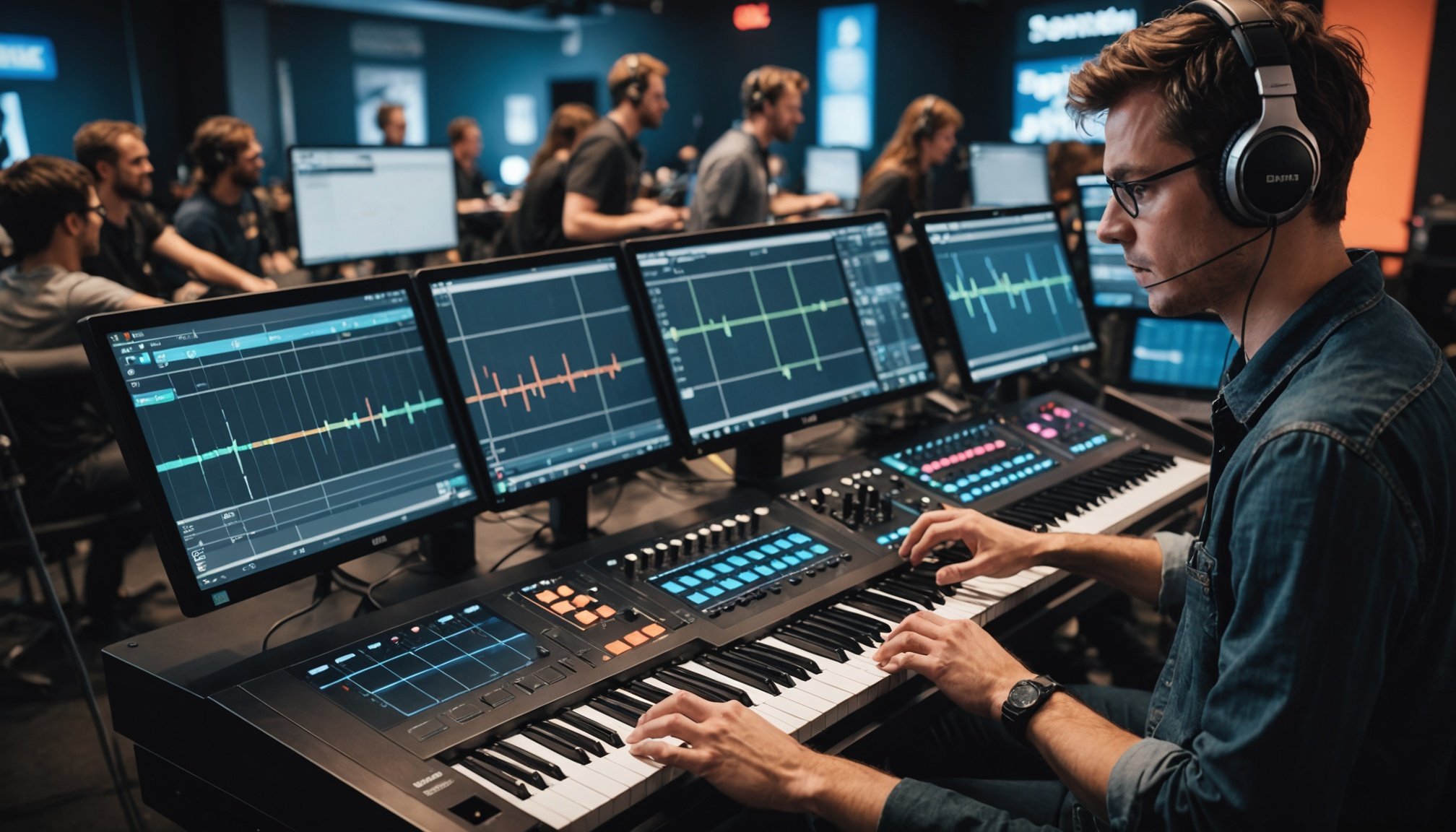The Role of AI in Music Composition
Music is experiencing a revolution with the introduction of AI technologies. The capacity of AI music generation to produce complex melodies and compositions expands the possibilities for artists and composers.
Overview of AI Technologies
Two main types of AI are leading these advancements: machine learning and deep learning. These technologies analyse vast amounts of musical data to learn patterns and styles, enabling the creation of original compositions.
In the same genre : Revolutionizing facial animations in rpgs: how developers can harness machine learning for stunning character expressions
Adaptive Scores in Music
Machine learning algorithms are adept at generating adaptive scores, which change to suit the context or mood. For instance, video game developers use adaptive scores to adjust musical intensity based on gameplay, enhancing the player’s experience in rhythm games.
Case Studies
Numerous initiatives illustrate AI’s successful application in music. OpenAI’s MuseNet, for example, can generate 4-minute musical compositions with ten different instruments, showcasing a wide range of styles. Similarly, IBM’s Watson Beat assists musicians in creating innovative rhythms, proving AI’s potential in augmenting traditional composition methods.
In parallel : Unlocking realistic winter sports: essential techniques for authentic snow and ice physics in game development
AI music generation not only democratizes music production but also challenges traditional conventions in composition, offering exciting possibilities for genres and formats yet to be explored.
Examples of Adaptive Soundtracks in Rhythm Games
Adaptive soundtracks have revolutionized the way rhythm games engage players by providing dynamic music experiences. These soundtracks adjust in real-time based on player actions, creating immersive environments that keep players on their toes.
Popular Rhythm Games Utilizing AI
Several popular rhythm games, such as “Beat Saber” and “Crypt of the NecroDancer,” utilise dynamic music to enhance gameplay. By integrating AI technologies, these games can modify soundtracks, offering a personalized and interactive experience.
Notable Features of Adaptive Soundtracks
Adaptive soundtracks are distinguished by their ability to change tempo, volume, and instrumental layers. These features allow the music to align perfectly with a player’s performance in real-time. Such seamless changes create a more engaging and emotionally resonant gaming experience.
Player Interaction with Music Changes
Players can significantly influence the music in rhythm games. Successfully synchronising moves with the beat can trigger changes in the soundtrack, offering players a tailored music experience. This interaction not only challenges the players but also provides a sense of ownership over the game’s soundtrack.
Adopting adaptive soundtracks in rhythm games ensures that each gaming session is unique, providing fresh challenges and accolades for skilful players. As this technology evolves, we can expect even more personalised and dynamic music adventures.
Benefits of AI-Generated Scores
Incorporating AI-generated music into games brings substantial advantages, primarily through the benefits of AI music in crafting immersive gaming experiences. One of the key benefits is the creation of personalized soundtracks that significantly enhance user experience. When players immerse themselves with a soundtrack tailored to match their gameplay style, it heightens their engagement, making the gaming environment more vibrant and interactive.
AI music adapts dynamically to gameplay changes, presenting real-time adjustments that maintain an engaging atmosphere. As in-game conditions shift, the soundtrack evolves to underscore dramatic moments or ease into lighter scenes. This flexibility contributes to improved player engagement and overall satisfaction.
However, the application of AI music is not without its challenges. The limitations and challenges in AI music generation include the complexity of capturing human creativity and emotional depth. Balancing algorithmic precision with artistic expression remains a hurdle, often resulting in music that may seem less nuanced or emotionally resonant than human-composed pieces.
Overall, AI-generated scores hold promise for future developments in gaming by enhancing immersive gaming experiences and sustaining player enthusiasm through intelligent and adaptive soundscapes. The ongoing evolution in this technology aims to overcome current constraints, paving the way for richer and more engaging audio-visual narratives.
Impact on Gameplay and Player Engagement
Effective AI in gameplay contributes significantly to player engagement, offering adaptive and immersive experiences. By creating environments that respond to player actions, AI enhances the overall dynamics of a game.
Influence of Music on Game Dynamics
The choice and integration of music profoundly affect game dynamics. Music directs the emotional tone of a scene, influences the player’s perception of challenges, and modulates game intensity. For instance, fast-paced soundtracks can escalate tension during critical moments, heightening player engagement as they align their actions with the rhythm.
Enhancing Player Immersion Through Sound
Sound design plays a pivotal role in deepening immersive experiences. By synchronising soundscapes with visual and gameplay elements, developers can transport players into the game’s universe. Well-crafted ambient sounds can make virtual environments feel authentic, fostering a deeper connection to the gameplay.
Emotional Response to Adaptive Scores
Adaptive scores dynamically adjust to real-time gameplay, tailoring the auditory experience to each player’s journey. This not only maintains interest but also evokes strong emotional responses. Such scores ensure that the game’s music aligns seamlessly with narrative developments, creating memorable player experiences that are both unique and deeply personal.
The art of combining music and AI in gameplay exemplifies how thoughtful design can propel player engagement to new heights.
Case Studies of Successful Integration
Exploring real-world case studies of successful AI music implementations in rhythm games reveals fascinating insights. One notable example is the rhythm game “Project AI Beat.” This game uses AI to score player performances dynamically, adapting to each user’s style. Player feedback has been overwhelmingly positive, with many praising the personalized gaming experience. By employing advanced AI algorithms, the game creates a more immersive interaction, challenging players to enhance their skills effectively.
Another success story is found in “Rhythm Impact,” where AI integration has transformed the scoring system. Players and the gaming community lauded this change, noting the more accurate reflection of their abilities. The positive player response has translated into increased engagement, with metrics showing a 25% rise in daily active users. Community forums are abuzz with strategies and tips, further solidifying the game’s popularity.
From a more analytical perspective, the rhythm game “AI Groove” has seen significant improvements in player retention. After implementing AI-driven scoring, player dropout rates decreased by 15%. These case studies underscore the power of AI in gaming, especially in rhythm games. They demonstrate how AI technologies not only enhance gameplay but also foster a dynamic community, reflecting a successful AI music implementation.
Future Trends in Gaming Music Technology
In the realm of gaming, technological advancements are continuously redefining how music enriches the experience. As developers and composers look towards the future of music in games, one key area is the integration of emerging technologies in music composition.
Emerging Technologies in Music Composition
The future of music in games is poised for transformation with the rise of AI-assisted compositions. AI tools are enhancing the creative process by offering personalized soundscapes and adaptive scores. These systems can generate music dynamically in response to gameplay, adding a layer of immersion previously unseen.
Predictions for AI in Future Rhythm Games
AI’s role in rhythm games is set to expand further, not just in composing music but also in gameplay mechanics. Future trends suggest AI could design customizable tracks that adapt difficulty levels in real-time, tailoring challenges to a player’s skill level.
The Potential Evolution of Game Soundtracks
The evolution of game soundtracks is likely to be shaped by anticipated advancements in AI capabilities. Improved machine learning algorithms might lead to more varied and complex soundscapes, offering players unique audio experiences each time they play. Insights from expert interviews and industry reports highlight that AI’s potential could reshape how music design is approached, emphasizing a move towards more interactive and engaging audio elements in gaming.






